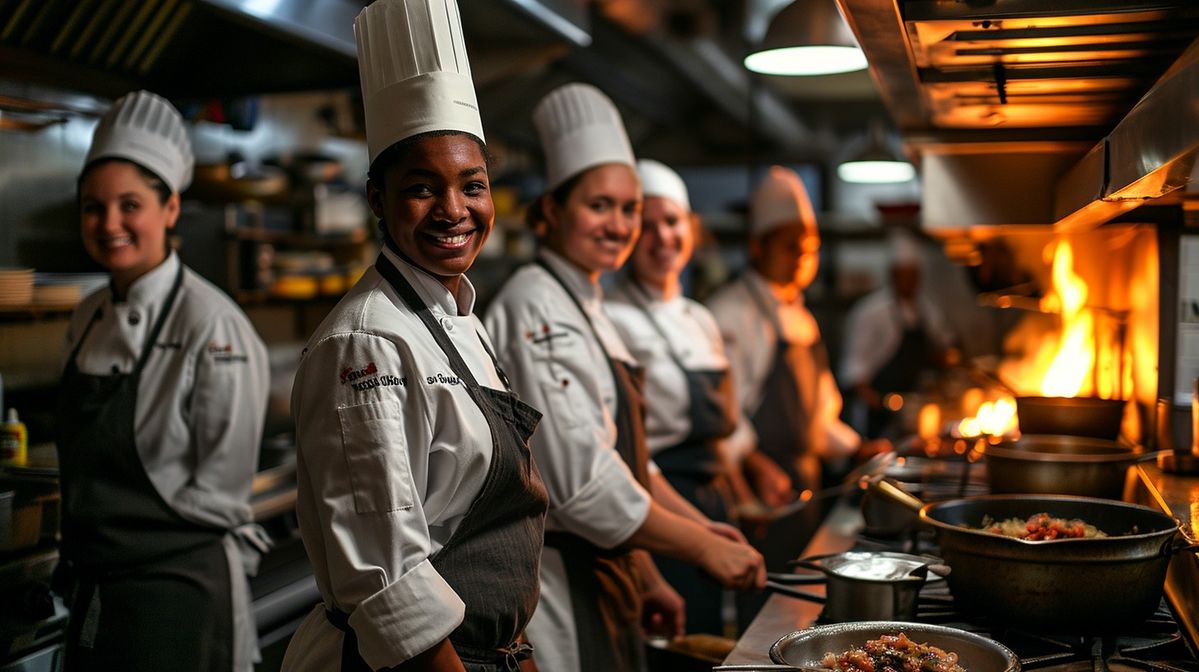France is globally celebrated as the heart of culinary excellence. From world-class Michelin-starred restaurants to traditional bistros and bakeries, the country’s food culture is a cornerstone of its identity. Behind the charm of French dining, however, lies a growing challenge: a shortage of workers in the hospitality industry. In 2025, this shortage has opened new doors for foreign chefs, cooks, and kitchen assistants seeking employment opportunities abroad, with many employers offering visa sponsorship to attract talent from around the world.
For food professionals and aspiring culinary workers, France’s labor needs represent an excellent opportunity not only to work in a country renowned for its cuisine but also to access long-term career prospects and possible residency pathways.
Why France Needs Foreign Chefs and Kitchen Assistants
The hospitality and restaurant industry in France has been under pressure for several years. The COVID-19 pandemic caused many workers to leave the sector, and the rebound in tourism has made it difficult for restaurants to meet rising demand. Younger generations are often less inclined to pursue physically demanding and high-pressure kitchen work, leading to significant labor shortages.
Chefs, sous chefs, line cooks, pastry makers, and kitchen assistants are now among the roles in highest demand. Employers in both large cities like Paris, Lyon, and Marseille, and smaller towns across the country are actively seeking foreign workers to keep their kitchens running smoothly.
Visa Sponsorship Opportunities
For foreign culinary workers, visa sponsorship is a key benefit. Many French employers, particularly those in the hospitality industry, are now willing to sponsor work permits to secure much-needed staff. Positions may be offered through:
-
Temporary work visas for seasonal or short-term contracts.
-
Skilled worker visas for chefs and experienced culinary professionals with formal training and relevant work experience.
-
Employer-sponsored permits, where the restaurant or hotel applies directly for authorization to hire foreign workers.
In some cases, long-term contracts can lead to residency opportunities, making France an attractive option for those seeking both professional and personal growth abroad.
Types of Roles Available
Chefs and Sous Chefs
Professional chefs with international experience are highly sought after in fine dining establishments and hotels. Sous chefs and head chefs are responsible not only for cooking but also for menu planning, supervising staff, and maintaining the standards of French cuisine.
Cooks and Line Cooks
Line cooks play an essential role in preparing meals quickly and efficiently, particularly in busy restaurants and brasseries.
Pastry Chefs and Bakers
France’s patisserie culture is world famous, and bakeries and pastry shops continue to face shortages of qualified staff.
Kitchen Assistants
For those starting out in the culinary industry, positions as kitchen assistants are available across the country. These roles include cleaning, preparing ingredients, assisting chefs, and maintaining hygiene standards.
Requirements for Foreign Applicants
To qualify for visa sponsorship jobs in France’s culinary industry, applicants generally need:
-
A valid passport and ability to travel to France.
-
Culinary training or work experience, particularly for chef roles.
-
Basic French language skills (helpful but not always mandatory).
-
Willingness to work flexible hours, including evenings, weekends, and holidays.
-
Proof of financial stability in some cases.
Kitchen assistant roles may have fewer requirements, making them accessible to younger applicants or those with limited formal training.
Step-by-Step Guide: How to Apply for Visa Sponsorship Jobs in France as a Chef or Kitchen Assistant
For those ready to pursue this opportunity, here is a practical roadmap to securing sponsorship and starting work in France.
Step 1: Research the Job Market
Begin by identifying the regions and cities in France where hospitality jobs are most available. Major cities such as Paris, Lyon, and Nice often advertise openings, but smaller towns with fewer local applicants may provide easier access to sponsorship opportunities.
Step 2: Prepare a Professional CV and Cover Letter
French employers expect clear, professional applications. Highlight your culinary experience, formal training (if applicable), and specific skills such as pastry work, menu development, or ability to handle high-volume kitchens. For kitchen assistants, emphasize reliability, teamwork, and eagerness to learn.
Step 3: Search for Sponsorship Jobs Online
Look for vacancies on official job portals such as Pôle Emploi (the French government’s employment site), as well as international platforms like Indeed, CatererGlobal, Hosco, and Glassdoor. Many employers specifically note if they are open to sponsoring foreign applicants.
Step 4: Apply Directly to Employers or Recruitment Agencies
Submit applications directly to restaurants, hotels, or catering companies. Specialized recruitment agencies for hospitality workers also help connect foreign candidates with French employers willing to provide visa sponsorship.
Step 5: Secure a Job Offer
Visa sponsorship begins with a valid job offer. Once an employer agrees to hire you, they will start the process of applying for authorization to bring in a foreign worker.
Step 6: Employer Applies for Work Authorization
The employer must submit a request to the French Ministry of Labour to hire a foreign worker. This includes details about the role, salary, and proof that they could not fill the position locally.
Step 7: Apply for a French Work Visa
Once the employer receives approval, you will apply for a long-stay work visa (visa de long séjour) at the French consulate in your home country. Required documents typically include your passport, job offer, employer authorization, proof of qualifications, and financial evidence.
Step 8: Travel to France and Begin Employment
After visa approval, you can travel to France and begin your role. Your employer may help with accommodation, initial orientation, and workplace integration.
Step 9: Apply for Residency Permit (If Applicable)
For long-term contracts, you may need to register for a residence permit within your first three months of arriving in France. Over time, continuous legal employment may open doors to permanent residency or citizenship.
Benefits of Working in France’s Culinary Sector
Foreign chefs and kitchen assistants working in France gain not only income and career growth but also cultural enrichment. The chance to work in the birthplace of modern gastronomy is invaluable for anyone in the food industry. Employers often provide meals during shifts, assistance with housing, and competitive wages.
Challenges to Consider
Kitchen work is demanding and often involves long, irregular hours. The cost of living in major French cities is high, and language barriers can create obstacles. However, these challenges can be offset by the career value, cultural immersion, and long-term opportunities available.
France’s growing demand for chefs, cooks, and kitchen assistants in 2025 presents a golden opportunity for foreign workers seeking both employment and international experience. With visa sponsorship options available, culinary professionals can secure legal work status and gain access to one of the world’s most prestigious food cultures.
By following the step-by-step application guide, prospective workers can increase their chances of securing a job offer, navigating the visa process successfully, and building a meaningful career in France’s dynamic culinary industry.
Book a one-on-one consultation for guidance tailored to your goals: https://selar.com/Book.A.Session









